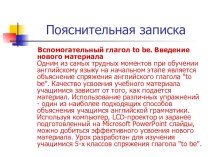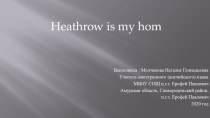- Главная
- Разное
- Бизнес и предпринимательство
- Образование
- Развлечения
- Государство
- Спорт
- Графика
- Культурология
- Еда и кулинария
- Лингвистика
- Религиоведение
- Черчение
- Физкультура
- ИЗО
- Психология
- Социология
- Английский язык
- Астрономия
- Алгебра
- Биология
- География
- Геометрия
- Детские презентации
- Информатика
- История
- Литература
- Маркетинг
- Математика
- Медицина
- Менеджмент
- Музыка
- МХК
- Немецкий язык
- ОБЖ
- Обществознание
- Окружающий мир
- Педагогика
- Русский язык
- Технология
- Физика
- Философия
- Химия
- Шаблоны, картинки для презентаций
- Экология
- Экономика
- Юриспруденция
Что такое findslide.org?
FindSlide.org - это сайт презентаций, докладов, шаблонов в формате PowerPoint.
Обратная связь
Email: Нажмите что бы посмотреть
Презентация на тему по английскому языку на тему Британия (8 класс)
Содержание
- 2. What Is British Film? What is a British Film?
- 3. Britain is made up of many regions,
- 4. A film can be called British if
- 5. Source: BFI
- 6. The Current BoomUK film production experienced a
- 7. Television Company Co Funding
- 8. BBC FilmBBC Films is the well-known film-making support
- 9. Film4Film4 is a free digital television channel available in the United Kingdom
- 10. Five Major Distributors dominate the UK film
- 11. Genre of British Social Realism
- 12. British’ness British film makers play off these things
- 13. Conventions of British Social Realism: Location shooting
- 14. New wave cinemaThe new wave films tended
- 15. Ken Loach and Mike LeighAssessed the impact
- 16. Mike Leigh’s Film’sThe breakdown of the collective
- 17. 4 Case Studies The Last King
- 18. Case Study 1: ‘The Last King of
- 19. The film was produced by 8 companies
- 20. Case Study 2: ‘This is England’ This
- 21. ‘This is England’ continued.
- 22. This Is England Continued… The critical response
- 23. Case Study 3: Working Title Films
- 24. An example of a
- 25. Case Study 4: DNA FilmsAndrew Macdonald’s DNA
- 26. Скачать презентацию
- 27. Похожие презентации

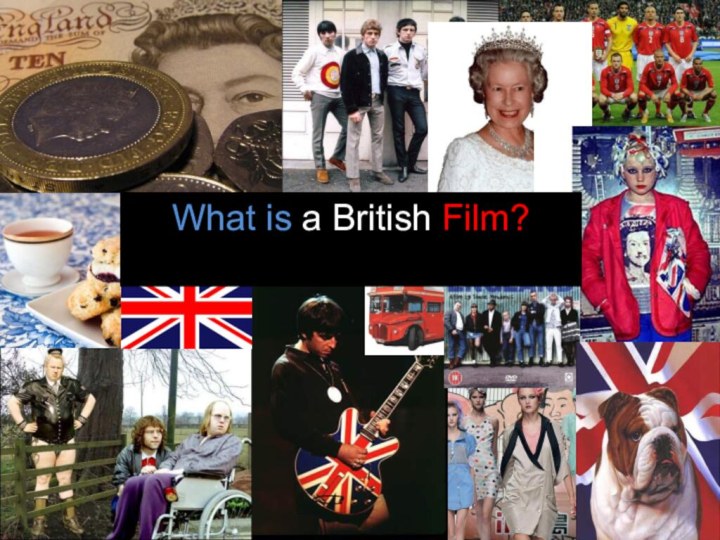




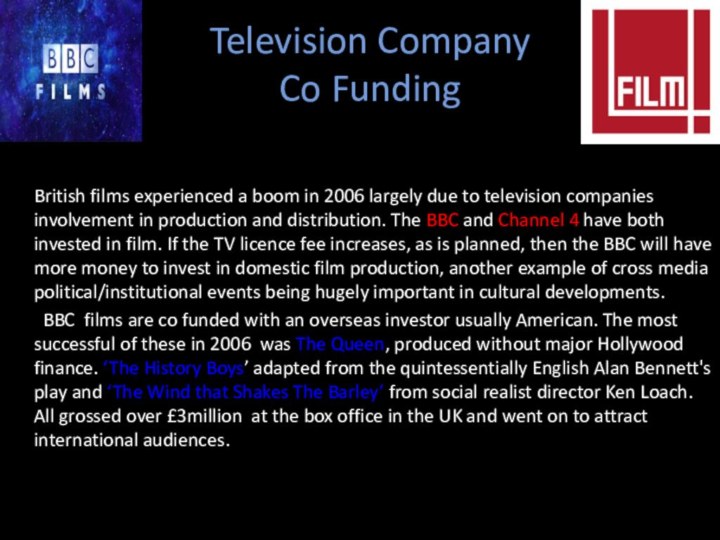
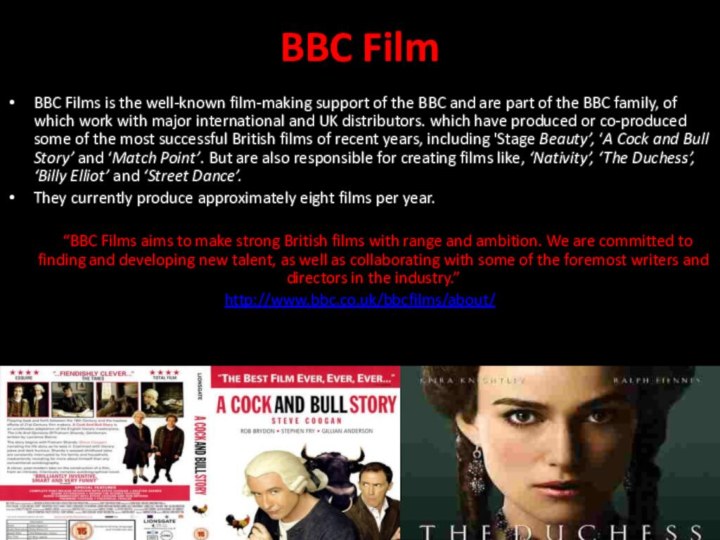


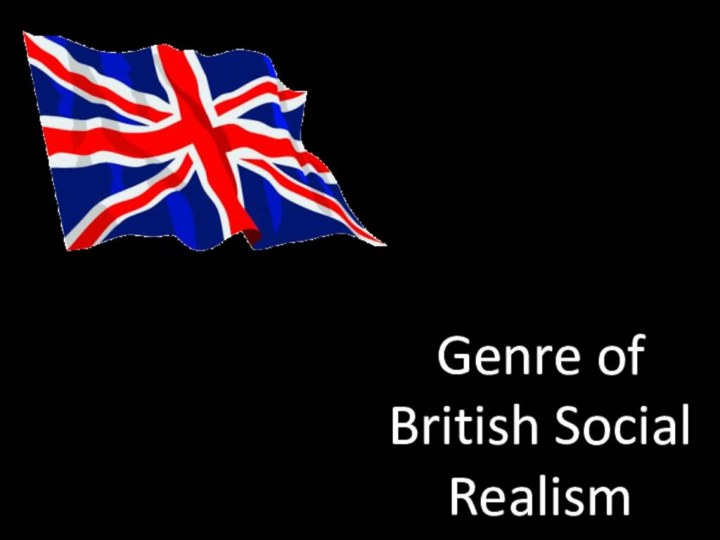
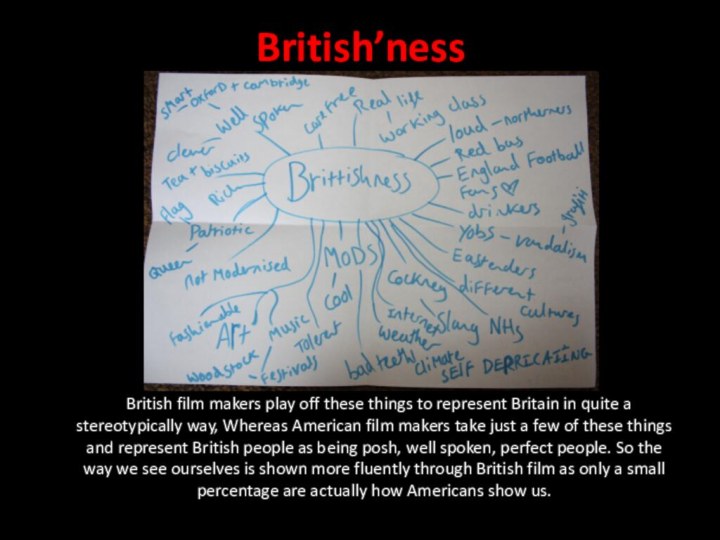
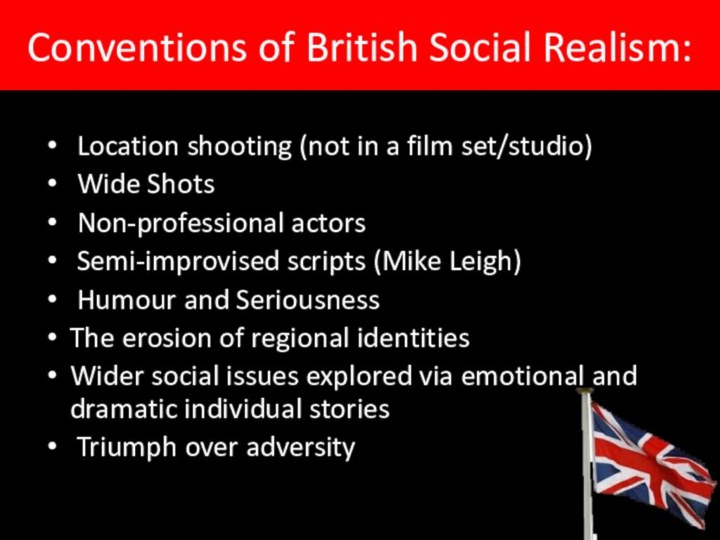
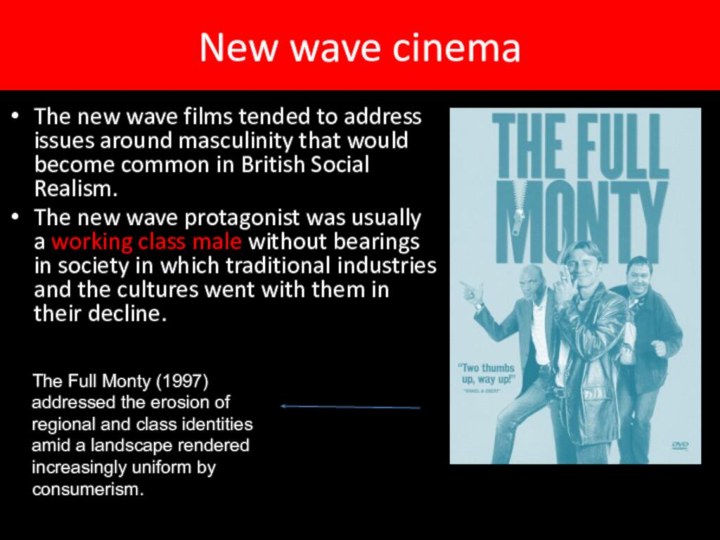


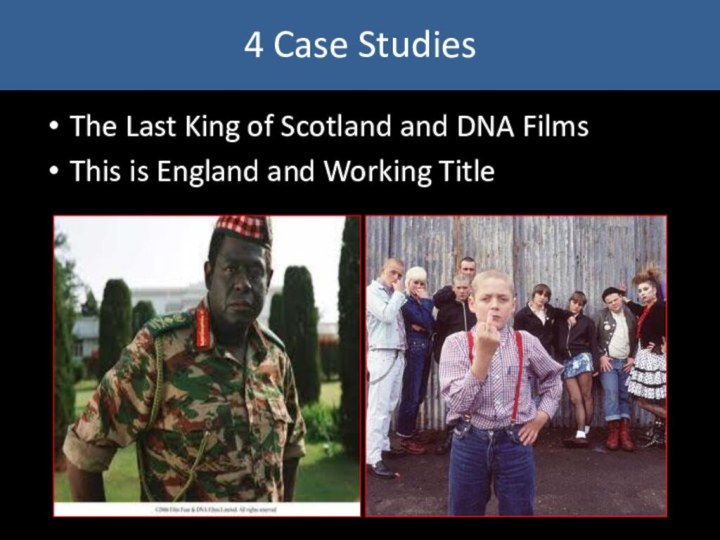
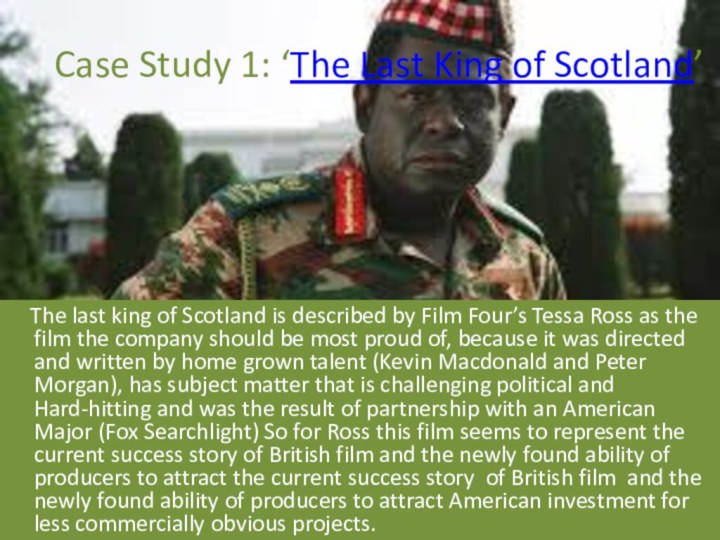
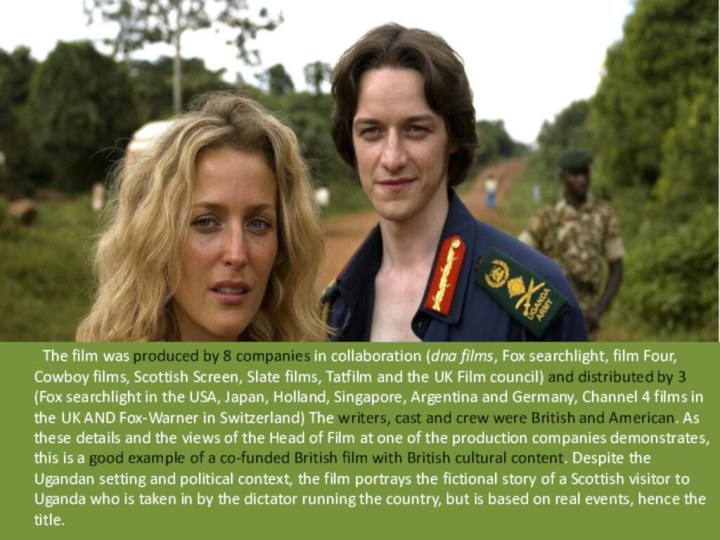



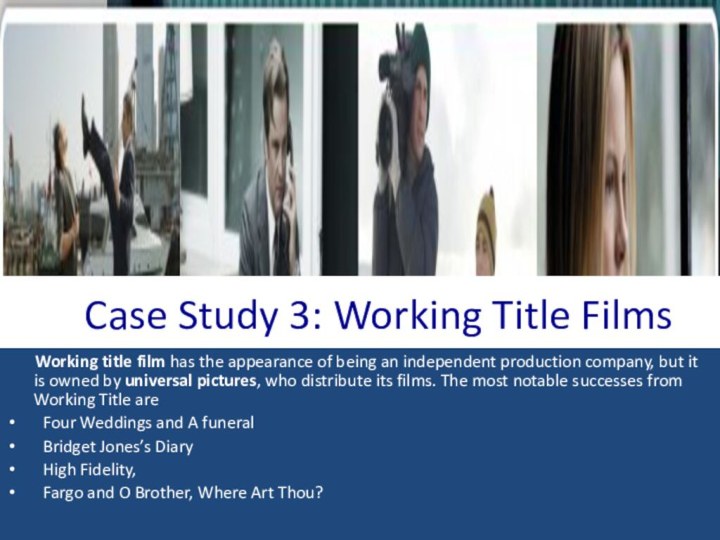
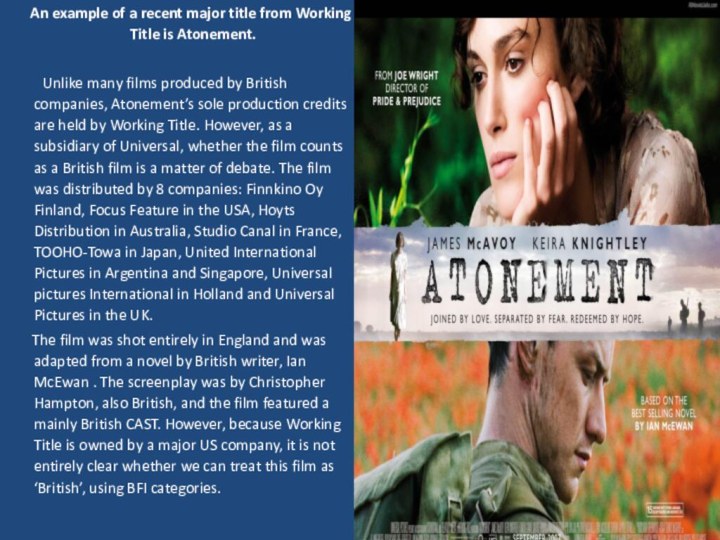
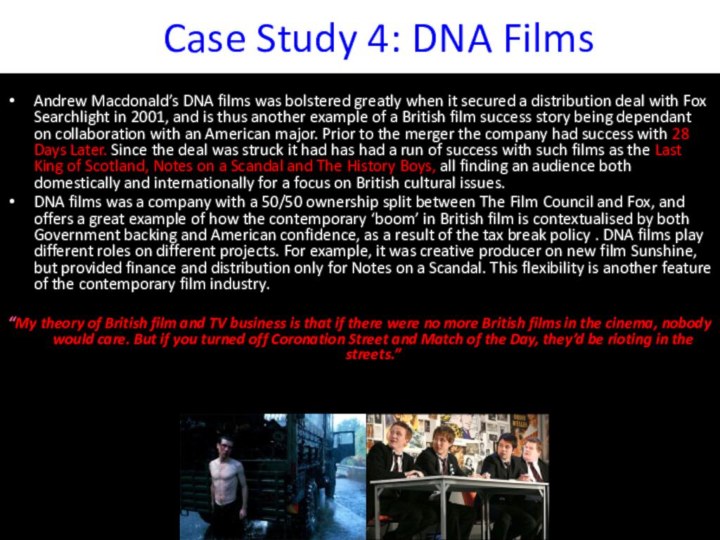
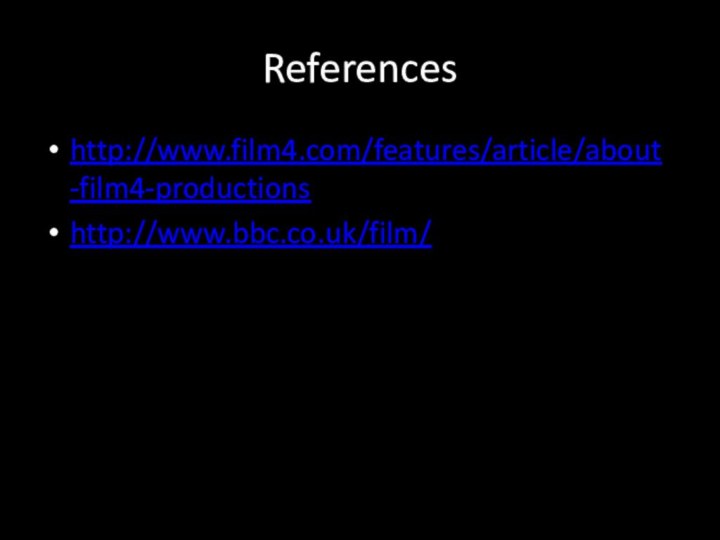
Слайд 3 Britain is made up of many regions, nations,
principalities, provinces, counties, races, religions, languages and dialects.
“Which
makes it impossible to state what is typically a British film without resorting to crude stereotypes.” However a British film does usually focus more on real life, such as people in the working class or with little money. They are usually problematic and tell life how it is which is less in your face than an American film with lots of effects and perfect people in perfect houses.
Слайд 4 A film can be called British if it
meets at least 3 of the following;
Has a British
producerHas a British production team
A British director
A predominately British cast
A subject matter that informs the British experience
A British identity as defined by sight and sound magazine in the review section
Which then leads it into a category;
Category A: An entirely British film
Category B: Majority UK funded
Category C: More common co-funding scenario
Category D: Describes a US film with some creative input from the UK
For example;
‘Brick Lane’, would be in category B because it’s a British film but lacks a few of the things to make it fully British, it doesn’t have a predominate British cast. However there is sometimes a Bollywood connection into British films like ‘Brick Lane’ and ‘Bend It Like Beckham’
Слайд 6
The Current Boom
UK film production experienced a crisis
in 2005 and early 2006. Investment in the making
of films dropped largely due to the rate of the English pound against the American dollar and the availability of low cost studios in eastern Europe.A new government policy in tax relief allows producers to be exempt from certain tax payments. Previously there had been a compulsion for films to be mainly shot in the UK for them to qualify for the avoidance of tax, but in March 2006 this was revised to allow for more overseas filming, an attractive amendment for investors.
British TV investment + American Film distribution companies = success for British Film
Слайд 7
Television Company Co Funding
British
films experienced a boom in 2006 largely due to
television companies involvement in production and distribution. The BBC and Channel 4 have both invested in film. If the TV licence fee increases, as is planned, then the BBC will have more money to invest in domestic film production, another example of cross media political/institutional events being hugely important in cultural developments.BBC films are co funded with an overseas investor usually American. The most successful of these in 2006 was The Queen, produced without major Hollywood finance. ‘The History Boys’ adapted from the quintessentially English Alan Bennett's play and ‘The Wind that Shakes The Barley’ from social realist director Ken Loach. All grossed over £3million at the box office in the UK and went on to attract international audiences.
Слайд 8
BBC Film
BBC Films is the well-known film-making support of
the BBC and are part of the BBC family, of
which work with major international and UK distributors. which have produced or co-produced some of the most successful British films of recent years, including 'Stage Beauty’, ‘A Cock and Bull Story’ and ‘Match Point’. But are also responsible for creating films like, ‘Nativity’, ‘The Duchess’, ‘Billy Elliot’ and ‘Street Dance’.They currently produce approximately eight films per year.
“BBC Films aims to make strong British films with range and ambition. We are committed to finding and developing new talent, as well as collaborating with some of the foremost writers and directors in the industry.”
http://www.bbc.co.uk/bbcfilms/about/
Слайд 9
Film4
Film4 is a free digital television channel available in the United Kingdom and
Republic of Ireland, owned and operated by Channel 4, that
screens films.Film four is an independent film company part of channel four. They showcase different titles including, best of British film-making, US independent films, Hollywood blockbusters, mainstream drama and comedy, foreign films and cult cinema. They also include special features and in-depth interviews and exclusive programming.
Film4 have backed films such as Slumdog Millionaire and the recent hit ‘The Iron Lady’
Слайд 10 Five Major Distributors dominate the UK film industry.
United International Pictures
Warner Brothers
Buena Vista
20th Century Fox
Sony
Roughly
9/10 films seen in the UK are viewed as a result of these distributors and are directly linked to the Hollywood production companies who make the films. Usually the blockbuster films we are familiar with are distributed via blanket release, so even if a small UK independent company manages to get its product into cinemas, it is usually competing for attention with one or more films that take on the status of an event. One of the outcomes of distribution arrangements outlined above is that half of the films released in Britain do not reach the whole country.
Слайд 12
British’ness
British film makers play off these things to
represent Britain in quite a stereotypically way, Whereas American
film makers take just a few of these things and represent British people as being posh, well spoken, perfect people. So the way we see ourselves is shown more fluently through British film as only a small percentage are actually how Americans show us.
Слайд 13
Conventions of British Social Realism:
Location shooting (not
in a film set/studio)
Wide Shots
Non-professional actors
Semi-improvised
scripts (Mike Leigh)Humour and Seriousness
The erosion of regional identities
Wider social issues explored via emotional and dramatic individual stories
Triumph over adversity
Слайд 14
New wave cinema
The new wave films tended to
address issues around masculinity that would become common in
British Social Realism.The new wave protagonist was usually a working class male without bearings in society in which traditional industries and the cultures went with them in their decline.
The Full Monty (1997) addressed the erosion of regional and class identities amid a landscape rendered increasingly uniform by consumerism.
Слайд 15
Ken Loach and Mike Leigh
Assessed the impact of
the consumer society on family life, charting the erosion
of the welfare state and the consensus that built it.Ken Loach's Film’s
Reflected the shift from the collectivist mood of the war years to the individualism of the post-war decades in its very form. Loach’s films went from the improvised long-take naturalism of ‘Poor Cow’ and ‘Kes’ to the social melodrama ‘Rolling Stones’ (1993) and ‘Ladybird Ladybird’ (1994), wider social issues now explored via emotional and dramatic individual stories.
Слайд 16
Mike Leigh’s Film’s
The breakdown of the collective consensus
in post-war Britain seems to be captured in the
tragicomic exchanges of ‘Life is Sweet’ (1990), Naked (1993) and Secrets and Lies (1996). Leigh examined the fractures in domestic and social life wrought by divisive Thatcherite policies in an increasingly fragmented and multicultural Britain.Women in Loach and Leigh are often complex and powerful individuals.
Слайд 18 Case Study 1: ‘The Last King of Scotland’
The last king of Scotland is described
by Film Four’s Tessa Ross as the film the company should be most proud of, because it was directed and written by home grown talent (Kevin Macdonald and Peter Morgan), has subject matter that is challenging political and Hard-hitting and was the result of partnership with an American Major (Fox Searchlight) So for Ross this film seems to represent the current success story of British film and the newly found ability of producers to attract the current success story of British film and the newly found ability of producers to attract American investment for less commercially obvious projects. Слайд 19 The film was produced by 8 companies in
collaboration (dna films, Fox searchlight, film Four, Cowboy films,
Scottish Screen, Slate films, Tatfilm and the UK Film council) and distributed by 3 (Fox searchlight in the USA, Japan, Holland, Singapore, Argentina and Germany, Channel 4 films in the UK AND Fox-Warner in Switzerland) The writers, cast and crew were British and American. As these details and the views of the Head of Film at one of the production companies demonstrates, this is a good example of a co-funded British film with British cultural content. Despite the Ugandan setting and political context, the film portrays the fictional story of a Scottish visitor to Uganda who is taken in by the dictator running the country, but is based on real events, hence the title.
Слайд 20
Case Study 2: ‘This is England’
This is
England is directed by the midlands director Shane Meadows.
The plot couldn’t be more indigenous, but this is not the England of films like The Queen, Notting Hill or Pride and Prejudice. Instead the 1970’s skin head movement, its uneasy relationship with West Indian culture and its distortion by the racist national front forms the backdrop for a story about the adolescent life of a bereaved boy. Meadows previously had box office and critical success with a range of other films all based on domestic life and relationships in the Midlands, including Twenty Four Seven, Once Upon a Time in the Midlands and Dead Mans Shoes. In his films the presence or absence of fathers and older male authority figures and the effects of such on young working class men are depicted with a mixture of comedy and sometimes disturbing drama.
Слайд 21
‘This is England’ continued.
Another major difference between the Meadows’ output and the
more commercially ‘instant’ British films from Working Title and similar companies, is the importance of cultural reference points – clothes, music, dialect – that only a viewer with a cultural familiarity with provincial urban life in the times depicted would recognise. ‘This is England’ was produced as a result of collaboration between no less than 7 companies – Big Arty Productions, EM Media, Film Four, Optimum releasing, Screen Yorkshire, The UK Film Council and Warp Films. It was distributed by 6 organisations –IFC Films (US), Netflix (US). Red Envelope Entertainment (US) and IFC First Take in the USA, Madman Entertainment in Australia and Optimum Releasing in the UK.
Слайд 22
This Is England Continued…
The critical response to
This Is England has largely been to celebrate a
perceived ‘return’ to a kind of cultural reflective film making that was threatened by extinction in the context of Hollywood’s dominance and the Governments preference for funding films with an eye on the US market, as this comment from Nick James, editor of the BFI’s Sight and Sound magazine shows:“I forgot when watching Shane Meadows’ moving evocation of skinhead youth This is England at the London Film Festival, how culturally specific its opening montage might seem: it goes from Roland Rat to Margaret Thatcher to the Falklands War to Knight Rider on television. What will people outside of Northern Europe make of the regalia of 1980’s skinheads from the midlands? Hopefully they will be intrigued. This Is England made me realise, too, that some British films are at last doing exactly what Sight and Sound has campaigned for; reflecting aspects of British life gain and maybe suffering the consequences of being harder to sell abroad.”
Слайд 23
Case Study 3: Working Title Films
Working title film has the appearance of
being an independent production company, but it is owned by universal pictures, who distribute its films. The most notable successes from Working Title areFour Weddings and A funeral
Bridget Jones’s Diary
High Fidelity,
Fargo and O Brother, Where Art Thou?
Слайд 24 An example of a recent
major title from Working Title is Atonement.
Unlike many
films produced by British companies, Atonement’s sole production credits are held by Working Title. However, as a subsidiary of Universal, whether the film counts as a British film is a matter of debate. The film was distributed by 8 companies: Finnkino Oy Finland, Focus Feature in the USA, Hoyts Distribution in Australia, Studio Canal in France, TOOHO-Towa in Japan, United International Pictures in Argentina and Singapore, Universal pictures International in Holland and Universal Pictures in the UK. The film was shot entirely in England and was adapted from a novel by British writer, Ian McEwan . The screenplay was by Christopher Hampton, also British, and the film featured a mainly British CAST. However, because Working Title is owned by a major US company, it is not entirely clear whether we can treat this film as ‘British’, using BFI categories.
Слайд 25
Case Study 4: DNA Films
Andrew Macdonald’s DNA films
was bolstered greatly when it secured a distribution deal
with Fox Searchlight in 2001, and is thus another example of a British film success story being dependant on collaboration with an American major. Prior to the merger the company had success with 28 Days Later. Since the deal was struck it had has had a run of success with such films as the Last King of Scotland, Notes on a Scandal and The History Boys, all finding an audience both domestically and internationally for a focus on British cultural issues.DNA films was a company with a 50/50 ownership split between The Film Council and Fox, and offers a great example of how the contemporary ‘boom’ in British film is contextualised by both Government backing and American confidence, as a result of the tax break policy . DNA films play different roles on different projects. For example, it was creative producer on new film Sunshine, but provided finance and distribution only for Notes on a Scandal. This flexibility is another feature of the contemporary film industry.
“My theory of British film and TV business is that if there were no more British films in the cinema, nobody would care. But if you turned off Coronation Street and Match of the Day, they’d be rioting in the streets.”








